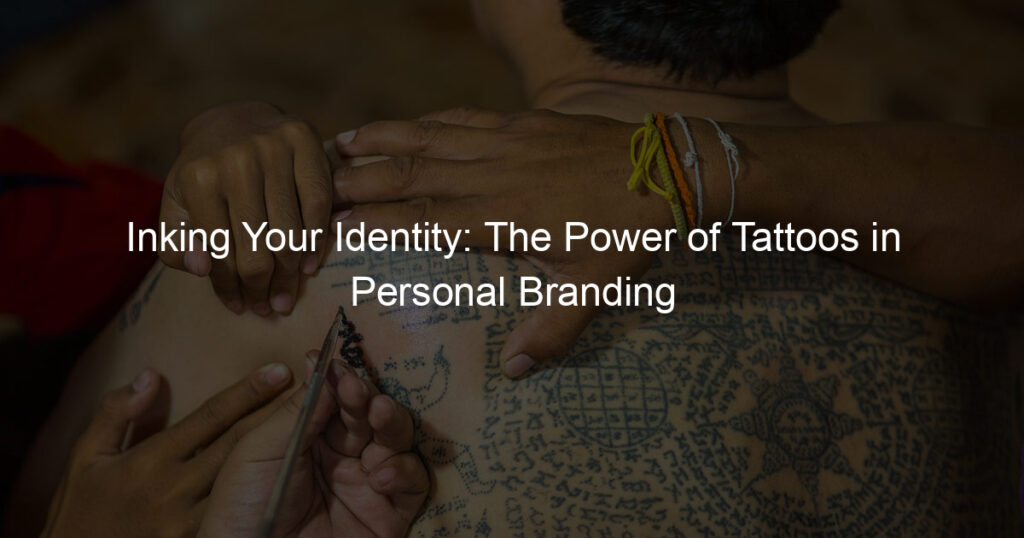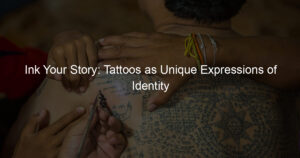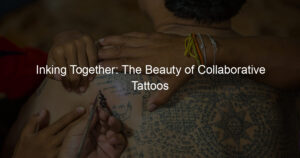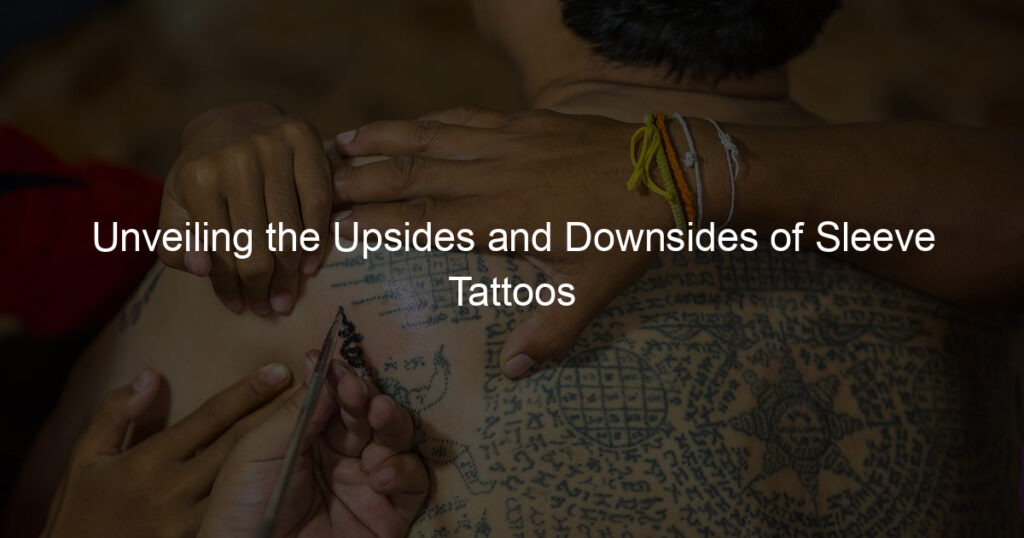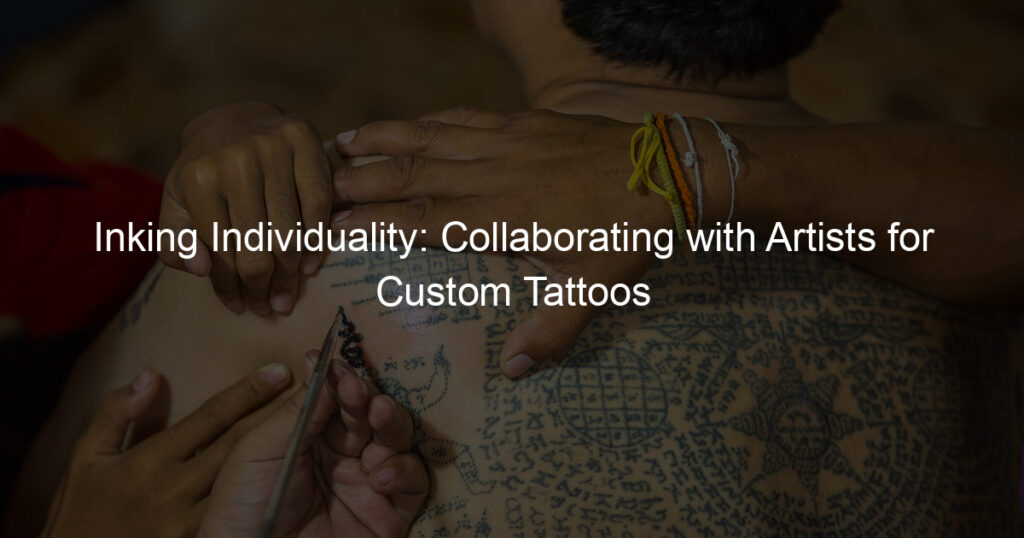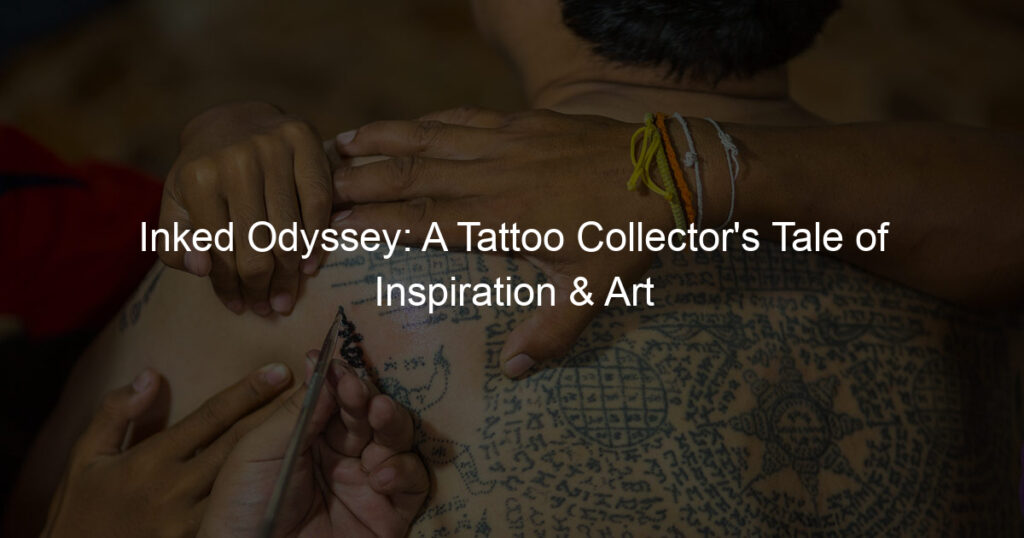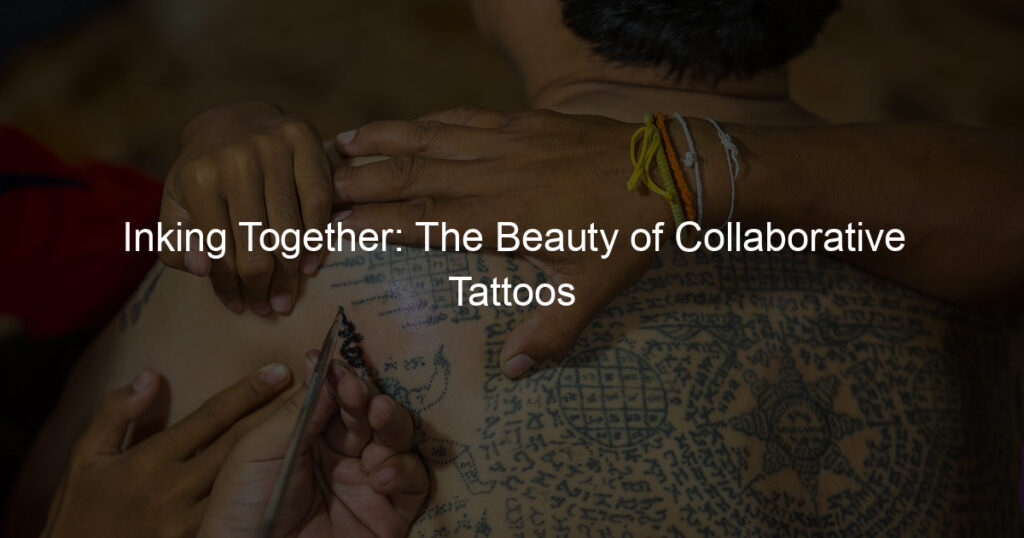
Introduction to Personal Branding Tattoos
Personal branding tattoos are a unique and powerful way to express one’s identity. They are more than just ink on skin; they are a statement about who you are and what you stand for. In this blog post, we will delve into the fascinating world of personal branding tattoos, exploring their definition and the reasons behind their rising popularity.
A personal branding tattoo is a type of body art that a person gets to represent their personal brand. This could be anything from a symbol that represents their profession or passion, to a quote that encapsulates their life philosophy. Unlike traditional tattoos, which are often chosen for their aesthetic appeal, personal branding tattoos are chosen for their meaning and the message they convey about the wearer.
Personal branding tattoos have been on the rise in recent years. According to a study by the Pew Research Center, nearly 40% of millennials have at least one tattoo, and many of these tattoos are personal branding tattoos. This rise can be attributed to several factors. First, tattoos have become more socially acceptable, allowing more people to use them as a form of self-expression. Second, the rise of social media has made personal branding more important than ever, with many people using tattoos as a way to stand out and make a statement about who they are.
As we continue to explore the world of personal branding tattoos, we will delve deeper into their significance, the unique connection between tattoos and personality, and the role of tattoos in identity formation. So, whether you’re considering getting a personal branding tattoo, or you’re simply curious about this fascinating trend, stay tuned for more insights and information.
Identity Tattoos: An Expression of Self
Identity tattoos are a special kind of body art. They are more than just ink on skin. They are a way for people to express who they are and what they believe in. Let’s dive deeper into understanding these tattoos and look at some examples.
-
Understanding Identity Tattoos
Identity tattoos are unique to each person. They can represent a person’s beliefs, values, or experiences. They can also symbolize a person’s culture or heritage. For instance, a person might get a tattoo of a symbol that represents their family’s history or a quote that has a special meaning to them.
These tattoos are a powerful way to express one’s self. They allow people to wear their identity on their skin for everyone to see. They can be a source of pride and a reminder of one’s roots and values.
Identity tattoos can also be a form of self-expression. They can help people feel more confident and comfortable in their own skin. They can also be a way for people to reclaim their bodies and their identities.
-
Examples of Identity Tattoos
There are many different types of identity tattoos. Here are a few examples:
- Cultural Tattoos: These tattoos often feature symbols or designs from a person’s cultural heritage. For example, a person of Irish descent might get a tattoo of a Celtic knot.
- Quote Tattoos: These tattoos often feature a quote that has a special meaning to the person. The quote could be from a book, a song, or a famous person that the person admires.
- Symbol Tattoos: These tattoos often feature a symbol that represents something important to the person. For example, a person might get a tattoo of a butterfly to symbolize transformation and growth.
These are just a few examples of identity tattoos. The possibilities are endless. The most important thing is that the tattoo has a special meaning to the person who gets it.
Tattoo Significance: More Than Just Ink
When we think of tattoos, we often think of them as just ink on skin. However, they are so much more than that. Tattoos can hold deep meanings, reflect personal values, and tell stories about the person who wears them. Let’s delve deeper into the significance of tattoos.
- The deeper meaning behind tattoos
Tattoos are not just about aesthetics; they often carry a deeper meaning. For some, a tattoo might symbolize a significant event or person in their life. For others, it could represent a belief or value they hold dear. For instance, a butterfly tattoo might symbolize transformation and personal growth, while an anchor could represent stability and strength.
According to a survey conducted by the Pew Research Center, 32% of people with tattoos say that their tattoos express something about their personality. This shows that tattoos are a powerful medium for self-expression and communication.
- How tattoos can reflect personal values and beliefs
Tattoos can also serve as a reflection of one’s personal values and beliefs. They can be a way to wear your heart on your sleeve, quite literally. For example, someone might get a tattoo of a religious symbol that represents their faith, or a quote that encapsulates their philosophy in life.
Furthermore, tattoos can also serve as a form of commitment to these values and beliefs. As tattoos are permanent, getting one is a significant decision. It’s a way of saying, “This is who I am, and this is what I stand for.”
In conclusion, tattoos are more than just ink on skin. They are a form of self-expression, a way to communicate one’s personality, values, and beliefs. So the next time you see someone with a tattoo, remember that there’s likely a story or a meaning behind it.
Tattoos and Personality: A Unique Connection
Have you ever wondered if there’s a connection between tattoos and personality? It’s a fascinating topic that we’re going to dive into. Tattoos are more than just ink on the skin. They can be a reflection of who we are, our values, and our personality traits. Let’s explore this unique connection further.
-
- How tattoos can reflect personality traits
Many people choose to get tattoos as a way to express their personality. For instance, someone who values freedom might get a tattoo of a bird in flight. Someone who is passionate about music might get a tattoo of a musical note. The colors, designs, and placement of the tattoo can all provide insights into a person’s character and personality traits.
-
- Case studies: Tattoos and Personality
Let’s look at some case studies that highlight the connection between tattoos and personality.
| Case Study | Personality Trait | Tattoo |
|---|---|---|
| Case Study 1 | Adventurous | Mountain Range |
| Case Study 2 | Artistic | Abstract Design |
| Case Study 3 | Family-oriented | Family Tree |
In each of these case studies, the individual’s tattoo reflects a key aspect of their personality. The adventurous person has a mountain range tattoo, symbolizing their love for exploration. The artistic individual has an abstract design, showcasing their creativity. The family-oriented person has a family tree tattoo, representing their strong family ties.
In conclusion, tattoos can indeed reflect personality traits. They are a unique form of self-expression that allows individuals to showcase their identity and values. So, the next time you see someone with a tattoo, remember that there might be a story or a personality trait behind it.
Tattoos in Self-Expression: A Personal Canvas
For many people, tattoos are more than just decorations on their skin. They are a form of self-expression, a way to tell their story, and a reflection of their personality. In this section, we will explore the role of tattoos in self-expression and provide some examples of how people use tattoos to express themselves.
-
- The role of tattoos in self-expression
Tattoos have been used as a form of self-expression for thousands of years. They can represent a person’s beliefs, values, experiences, or interests. Some people use tattoos to commemorate important events in their lives, while others use them to display their artistic tastes or to make a statement about their identity.
According to a 2012 Harris Poll, 14% of all Americans have at least one tattoo, and the majority of them say their tattoos make them feel more unique. This data shows that tattoos play a significant role in self-expression for many people.
Moreover, tattoos can also serve as a form of communication. They can send a message to others about who you are and what you stand for. In some cultures, tattoos can even signify a person’s social status or role within the community.
-
- Examples of self-expression through tattoos
There are countless ways people use tattoos to express themselves. Here are a few examples:
-
-
- Symbolic Tattoos: Some people choose symbols that have a personal meaning to them. For example, a person might get a tattoo of a rose to symbolize love or a butterfly to symbolize transformation.
- Memorial Tattoos: These tattoos are used to commemorate a loved one or a significant event in a person’s life. For example, some people get tattoos of a loved one’s name or a date that holds special significance.
- Artistic Tattoos: Some people use their bodies as a canvas for beautiful artwork. These tattoos may not have a specific meaning but are chosen for their aesthetic appeal.
- Statement Tattoos: These tattoos are used to make a statement or take a stand on an issue. For example, someone might get a tattoo of a feminist symbol to express their support for women’s rights.
-
These examples show that tattoos can be a powerful tool for self-expression. They allow people to express their individuality, tell their story, and communicate their beliefs and values to the world.
Exploring Tattoo Culture: A Global Phenomenon
As we journey around the world, we find that tattoos are a universal language. They are a form of self-expression that transcends borders and cultures. Let’s delve into understanding this global phenomenon and its influence on personal branding.
- Understanding Tattoo Culture
Tattoo culture is more than just about body art. It’s a lifestyle, a form of self-expression, and a way of telling a story. Tattoos are seen as a way to honor traditions, remember loved ones, or symbolize personal journeys. They can be a form of rebellion or a mark of belonging to a certain group or community.
Statistics show that nearly 38% of young people aged 18 to 29 have at least one tattoo. This shows the growing acceptance and popularity of tattoos in modern society.
- The Influence of Tattoo Culture on Personal Branding
Personal branding is all about creating a unique identity and image that sets you apart from others. Tattoos can play a significant role in this. They can be a powerful tool for self-expression and can help to convey your personal brand to the world.
For instance, a musician might have a tattoo of a musical note to symbolize their passion for music. An entrepreneur might have a tattoo of a lion to represent their courage and leadership skills. These tattoos become a part of their personal brand, telling a story about who they are and what they stand for.
In conclusion, tattoos are not just a form of body art, but a global phenomenon that has a significant influence on personal branding. They are a way for individuals to express their identity, tell their story, and create a unique personal brand.
Body Art and Identity: The Power of Personal Branding
Body art, specifically tattoos, has been a powerful tool for personal branding and identity formation. In this section, we will delve into how body art contributes to identity formation and look at some case studies that highlight the relationship between body art and identity.
-
-
How Body Art Contributes to Identity Formation
-
Body art is a unique form of self-expression that allows individuals to convey their personal stories, beliefs, and values in a visible and enduring way. Tattoos, in particular, can serve as a visual representation of one’s identity, acting as a personal brand that distinguishes an individual from others.
Body art can also serve as a tool for self-discovery and self-definition. As individuals choose designs that resonate with them, they are often exploring and defining aspects of their identity. Over time, these pieces of body art can become integral parts of an individual’s self-concept and personal brand.
-
-
Case Studies: Body Art and Identity
-
Let’s examine a couple of case studies that illustrate the power of body art in identity formation and personal branding.
Case Study 1: The Entrepreneur
Consider the case of a young entrepreneur who gets a tattoo of a lion on his arm. The lion, a symbol of courage and leadership, represents his entrepreneurial spirit and drive to succeed. This tattoo becomes a part of his personal brand, reflecting his identity as a determined and fearless business owner.
Case Study 2: The Survivor
Another example is a woman who gets a tattoo of a phoenix rising from the ashes after overcoming a difficult period in her life. The phoenix symbolizes her resilience and ability to rise above challenges. This tattoo becomes a powerful symbol of her identity as a survivor and a testament to her strength.
In conclusion, body art plays a significant role in identity formation and personal branding. It allows individuals to express their unique identities and tell their personal stories in a way that is visible and enduring.
Personal Branding and Body Art: A Dynamic Duo
Body art and personal branding are two concepts that have become increasingly intertwined in our modern society. They both serve as powerful tools for self-expression and identity formation. When combined, they can create a unique and compelling personal brand that stands out from the crowd.
-
- How body art can enhance personal branding
Body art, particularly tattoos, can significantly enhance personal branding. They can act as a visual representation of one’s personality, values, and interests. This can help create a more authentic and memorable personal brand.
For instance, a tattoo of a musical note might indicate a passion for music, while a nature-themed tattoo could suggest a love for the environment. These visual cues can help others quickly understand who you are and what you stand for, making your personal brand more impactful.
-
- Examples of successful personal branding through body art
There are many examples of individuals who have successfully used body art to enhance their personal brand. Let’s take a look at a few:
-
-
- David Beckham: The former footballer’s tattoos are as famous as his sporting career. Each one tells a story about his life, values, and passions, contributing to his unique personal brand.
- Rihanna: The singer’s tattoos are a key part of her edgy, rebellious brand. They reflect her personal experiences and beliefs, making her brand feel authentic and relatable.
- Johnny Depp: The actor’s numerous tattoos each have a personal significance, adding depth and intrigue to his personal brand.
-
These examples show how body art can be used to create a distinctive and memorable personal brand. They illustrate the power of tattoos not just as a form of self-expression, but also as a branding tool.
In conclusion, body art and personal branding can form a dynamic duo. Tattoos can act as a visual extension of your personal brand, helping to convey your unique personality and values. By thoughtfully choosing your body art, you can create a personal brand that truly reflects who you are.
Tattoos and Individuality: Standing Out from the Crowd
One of the most powerful ways to express your individuality is through tattoos. They are a form of self-expression that allows you to showcase your unique personality and stand out from the crowd.
-
- The role of tattoos in promoting individuality
Tattoos have been used for centuries as a way to express individuality. They are a form of body art that allows people to create a visual representation of their personality, beliefs, and experiences. Tattoos can be a powerful tool for self-expression, allowing individuals to make a statement about who they are and what they stand for.
For example, someone might get a tattoo of a butterfly to symbolize transformation and growth. Another person might get a tattoo of a musical note to express their love for music. The possibilities are endless, and the beauty of tattoos is that they are as unique as the individuals who wear them.
-
- Case studies: Tattoos and Individuality
There are countless examples of how tattoos can promote individuality. Let’s look at a few case studies:
| Name | Tattoo | Meaning |
|---|---|---|
| John | Phoenix | Symbolizes rebirth and new beginnings after overcoming a difficult period in his life. |
| Sarah | Compass | Represents her love for travel and adventure. |
| Mike | Anchor | Stands for stability and strength, reflecting his role as a father and husband. |
These case studies illustrate how tattoos can be a powerful form of self-expression, allowing individuals to showcase their unique personalities and stand out from the crowd.
In conclusion, tattoos are more than just ink on skin. They are a form of self-expression that allows individuals to showcase their unique personalities and stand out from the crowd. Whether it’s a symbol of personal growth, a passion for travel, or a reflection of one’s role in the family, tattoos allow individuals to express their individuality in a unique and powerful way.
Role of Tattoos in Identity Formation: A Lasting Impression
As we delve deeper into the world of tattoos, we discover their profound impact on identity formation. Tattoos are more than just ink on skin; they are a form of self-expression that can shape an individual’s identity.
-
- How tattoos can shape identity
Tattoos can play a significant role in shaping one’s identity. They allow individuals to express their personal beliefs, values, and experiences in a visible and lasting way. For some, a tattoo can symbolize a significant life event or personal achievement. For others, it can represent a deeply held belief or value.
By choosing to get a tattoo, individuals make a conscious decision about how they want to present themselves to the world. This act of self-definition can be empowering, helping people to feel more confident and secure in their identity.
-
- Examples of identity formation through tattoos
There are countless examples of how tattoos can contribute to identity formation. Let’s consider a few.
One example is the tradition of military tattoos. Soldiers often get tattoos to commemorate their service, with designs that reflect their rank, unit, or battles they’ve fought. These tattoos become a part of their identity, symbolizing their commitment and sacrifice.
Another example is cultural tattoos. In many cultures, tattoos are used to signify one’s place within the community. For instance, in Maori culture, the traditional facial tattoo or ‘moko’ represents one’s genealogy and personal history.
Finally, tattoos can also be used to signify personal growth or transformation. Someone who has overcome a significant challenge, such as addiction or illness, might get a tattoo to symbolize their journey and resilience. This tattoo becomes a part of their identity, a testament to their strength and perseverance.
In conclusion, tattoos can play a pivotal role in identity formation. They allow individuals to express their unique stories, beliefs, and experiences in a visible and lasting way. Whether it’s a military tattoo symbolizing service, a cultural tattoo signifying community, or a personal tattoo representing growth, these pieces of body art leave a lasting impression, shaping our identities in profound ways.

